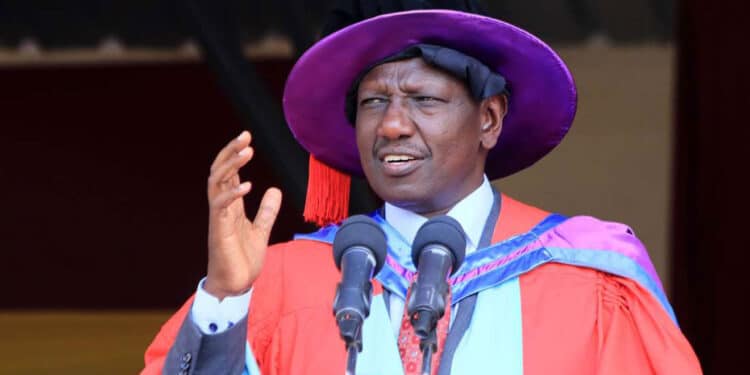President William Ruto often refers to himself as Dr. Ruto, a title earned after his academic journey at the University of Nairobi (UoN).
His social media profile prominently displays “William Ruto, PhD,” and he has frequently invoked his academic credentials to counter critics of his Kenya Kwanza administration.
On Thursday, February 6, while in Garissa, Ruto once again used his doctorate as a shield against critics, this time targeting those questioning the government’s livestock vaccination programme.
He dismissed them as “unqualified” to address him due to their lack of adequate education.
“When you see those complaining, they are people who I have no idea where they went to school. I have a PhD, I understand what is going on in Kenya—what are these people with some little education trying to teach me? What can you teach me?” he posed.

Ruto Bragging About His PHD
However, this is not the first time Ruto has used strong words to defend the program.
In December last year, he faced backlash for a similar attack, branding opponents of the initiative as “mad, unreasonable, and possibly stupid.”
“Anybody opposing vaccination to eliminate Foot and Mouth Disease (FMD) and Peste des Petits Ruminants (PPR) is simply mad, unreasonable and possibly stupid,” he said then.
But beyond the political rhetoric, what exactly did President Ruto study for his PhD?
Also Read: Ruto Clarifies Bill Gates Involvement in Livestock Vaccination
Details of President Ruto PHD in Plant Ecology
According to the UoN website, Ruto’s academic journey at the university began in 1987 when he pursued a Bachelor of Science (BSc.) degree in Botany and Zoology at Chiromo Campus, graduating in 1990.
Botany is the scientific study of plants, including their structure, properties, and processes like photosynthesis. It covers areas such as plant classification, genetics, ecology, and plant diseases.
Zoology is the scientific study of animals, focusing on their behavior, structure, physiology, classification, and distribution. It includes various subfields such as ecology, genetics, and evolutionary biology related to animals.
He furthered his education by enrolling for a Master of Science (MSc.) in Plant Ecology degree, which he completed in 2011.
Ruto continued his academic pursuit and enrolled for a Ph.D. in Plant Ecology in 2012, successfully graduating on December 21, 2018.
His graduation ceremony was presided over by the former UoN Chancellor, Dr. Vijoo Rattansi, and witnessed by the 4th President, Uhuru Kenyatta.
Ruto’s PhD thesis was titled Influence of Anthropogenic Activities on Land Use/Cover Changes and Environmental Quality of Saiwa Wetland Watershed, Western Kenya.
What Does Plant Ecologists Do?
Plant Ecology is the study of plants in relation to their environment, focusing on how they interact with both biotic and abiotic factors.
This field explores the distribution of plant species, examining why certain plants thrive in specific areas while others do not.
It also looks at how plants form communities, coexisting with other species to create ecosystems.
Plant ecologists investigate how plants adapt to environmental challenges such as soil type, temperature, and water availability, as well as how they respond to disturbances like fires or climate change.
Additionally, plant ecology studies plant interactions with other organisms, such as herbivores, pollinators, and symbiotic relationships.
He has also authored several papers including a paper titled ‘Biological and Physico-chemical’ status of two wetlands in the Nairobi National Park, Kenya’ which he presented for his MSc.
Also Read: Ruto and Trump Aide on Phone Call Again
PhD Requirements and Timeline
Doctoral degrees require PhD candidates to take advanced courses, pass a comprehensive exam (sometimes called “comps”), and produce an original body of research, such as a dissertation, to obtain the degree.
PhD Requirements:
- Advanced Coursework: Graduate-level courses that dive deeply into sub-topics within your field.
- Comprehensive Exam (Comps): A comprehensive exam to assess your knowledge in your field, covering history, theories, and major research.
- Dissertation: Original research that contributes new knowledge to your field.
- Teaching or Research Assistantship (Optional): Some programs require you to gain experience in academia or research through a teaching or research assistant role.
PhD Timeline:
- Year 1: Complete advanced coursework to build a strong foundation in your field.
- Year 2: Finish advanced coursework and start preparing for comprehensive exams.
- Take and defend your comprehensive exams; begin drafting your dissertation proposal in year 3.
- Year 4: Submit and get approval for your dissertation proposal, then begin work on your dissertation.
- Year 5: Finish writing your dissertation, submit for committee approval, and defend your research. Apply for graduation after approval.
Cost of PHD Across Various Universities
The cost of a PhD in Kenya varies depending on the university and program. Several factors influence the fees, including the number of semesters, the student’s nationality, and the nature of the program.
At the University of Nairobi (UoN), PhD degrees are offered in various disciplines involving coursework, examinations, and a thesis.
In the School of Biological Sciences, the total fees for a PhD by thesis are Ksh 450,000.00 for local students. For foreign students, the fees are USD 15,539, which is equivalent to approximately Ksh 2,008,551.
At Kenyatta University, full-time PhD fees for the same program are Ksh 367,200 per year for East African students and Ksh 459,000 per year for Non-East African students.
Egerton University fees are Ksh 251,900 for the first year, with Ksh 245,400 for each subsequent year, along with additional Ksh 180,000 in expenses for the remainder of the program.
Follow our WhatsApp Channel and join our WhatsApp Group for real-time news updates.












































































